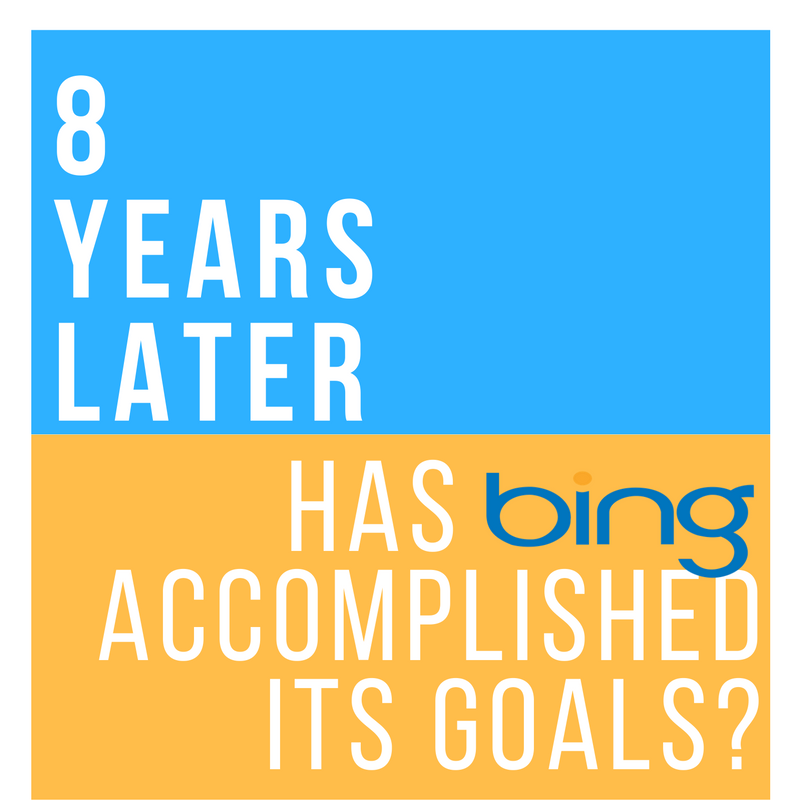8 Years Later: Has Bing Accomplished Its Goals?

It may not feel like it, but Bing launched over 8 years ago. While the Microsoft-backed competitor has not overtaken the throne Google sits upon, nearly everyone who uses Google knows about Bing. So does that mean Bing is a success? Why did Microsoft decide to compete with a company that had a near monopolistic grasp of the search engine industry? What is Microsoft’s goal for Bing? Let’s delve into where Bing is, where it’s been and where it’s going.
Early Bing
When Bing first launched, it was followed by a massive marketing push by Microsoft to thrust some type of Brand Awareness onto their product. People understood that Bing was a search engine, but the question that still stood was “Why Bing?”. Microsoft’s efforts were admirable, to say the least. While Google (at the time) only showed website listings for standard search results, Bing stood out by showing any type of media it felt was relevant. Searching for “Guy rides roller coaster”? Google would show you an article while Bing would show a video.
So the difference was clear and made Bing different from Google, but that effect only lasted so long. It didn’t take the world’s leading search engine company long to start showcasing pictures, videos, etc. in standard search engine results. And like that, the only thing that made Bing different was the background image (which Google also copied by frequently changing its website art).
Present-day Bing
So how is Bing doing today? The answer is: surprisingly well. Bing has risen to hold over 20% of the American search engine market share today. This would be impressive itself, but add on the fact that Yahoo uses Bing for search, which means Bing is responsible for nearly 1/3 of the American search engine market. So Google went from a near monopoly (minus Yahoo) to holding 2/3 of the market. Not too bad of a dent for Bing to make in only 8 years. Not to mention, both Cortana and Siri use Bing for their voice search functions. So we can see Bing as a growingly dominant force in mobile search as well.
The Future of Bing
Is Bing on the rise to overtaking Google as the predominant search engine? No. In fact, it’s safe to guess that Bing is reaching the apex of its market share. What Bing has going for it is Cortana and Siri. These virtual assistants are built into every Microsoft and Apple product possible and both use Bing, so the search engine should have an avenue to success, right? Not so fast. While Microsoft computers are certainly a dominant force in the market, the company has limped into the smartphone market in recent years. So don’t expect Cortana to dominate the mobile search market anytime soon.
“But Apple is dominating the smartphone market!” you may cry out. Maybe in America, but not globally. On the world scale, Samsung crushes Apple in the smartphone market. Not only that, but sales for the iPhone 7 were the first in Apple’s history not to be higher than the previous iteration. Throw in the bad publicity for the iPhone 7’s headphone jack fiasco and the fact that nearly every smartphone company who isn’t Apple uses Android (owned by Google) for an Operating System, and you have a very bleak scenario for Bing.
As mobile search becomes more prominent, Bing is going to face a tougher environment than it did 8 years ago. By no means are we predicting death for the second largest search engine, but Google has adapted in all the right ways to set itself up for future success. It doesn’t help that Bing seems to be playing catch up with Google in terms of algorithm updates. It seems as though every time a Google update goes live, we hear about Bing developing an update to do the same thing.





Have your say
Feel free to take part in the discussion! Please be nice and do not include any abusive comments or spam. All comments are moderated and MAXtech Agency reserves the right to delete any comment.